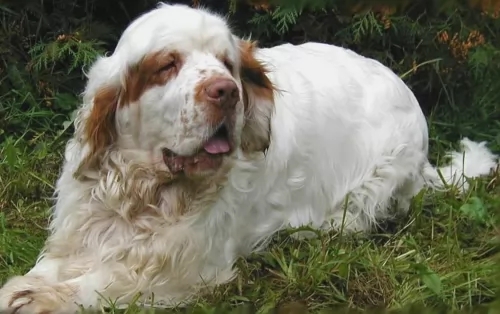 Petzlover
Petzlover Bolognese is originated from Italy but Clumber Spaniel is originated from United Kingdom. Bolognese may grow 21 cm / 8 inches shorter than Clumber Spaniel. Bolognese may weigh 35 kg / 77 pounds lesser than Clumber Spaniel. Both Bolognese and Clumber Spaniel has almost same life span. Both Bolognese and Clumber Spaniel has almost same litter size. Bolognese requires Moderate Maintenance. But Clumber Spaniel requires High Maintenance
Bolognese is originated from Italy but Clumber Spaniel is originated from United Kingdom. Bolognese may grow 21 cm / 8 inches shorter than Clumber Spaniel. Bolognese may weigh 35 kg / 77 pounds lesser than Clumber Spaniel. Both Bolognese and Clumber Spaniel has almost same life span. Both Bolognese and Clumber Spaniel has almost same litter size. Bolognese requires Moderate Maintenance. But Clumber Spaniel requires High Maintenance
 The Bolognese has already been on record since the 13th century, being particularly popular among the aristocracy during the Renaissance. The breed hails from Italy. He belongs to a family of dogs that include the Maltese and Bichon Frise, all with similar temperaments and looks. Even though there are these similarities the Bolognese is a breed on its own – a distinctive breed.
The Bolognese has already been on record since the 13th century, being particularly popular among the aristocracy during the Renaissance. The breed hails from Italy. He belongs to a family of dogs that include the Maltese and Bichon Frise, all with similar temperaments and looks. Even though there are these similarities the Bolognese is a breed on its own – a distinctive breed.
The exact ancestry of the Bolognese isn’t altogether clear. The dog breed was brought to England in 1990 by Liz Stannard and it was in 2001 that the breed was shown at dog shows. He is classified as a toy companion breed.
 Ever since winning in Confirmation at Westminster Kennel Club’s annual show, the popularity of the Clumber Spaniel has increased markedly. The breed of Clumber Spaniel comes from the United Kingdom and it is the largest of all the spaniels. The breed is named for the Clumber Park where it was developed in Nottinghamshire. The Clumber Spaniel a=was designed to be a gundog or hunter in heavy weeds or cover. They have been popular with the Royal Family and were kept by King George V, King Edward VII, and Prince Albert.
Ever since winning in Confirmation at Westminster Kennel Club’s annual show, the popularity of the Clumber Spaniel has increased markedly. The breed of Clumber Spaniel comes from the United Kingdom and it is the largest of all the spaniels. The breed is named for the Clumber Park where it was developed in Nottinghamshire. The Clumber Spaniel a=was designed to be a gundog or hunter in heavy weeds or cover. They have been popular with the Royal Family and were kept by King George V, King Edward VII, and Prince Albert.
It is possible that during the French Revolution, the Duc de Noailles gave his spaniels to the Duke of Newcastle in Nottinghamshire, These spaniels, Alpine Spaniel, are extinct. At the time they were bred with Basset Hounds and Great Pyrenees.
Another line of thought has the Clumber Spaniel descending form an ancient Bleinheim Spaniel, which was used to later develop the King Charles Spaniel.
Whichever theory is true, we know that they were first bred and improved by William Mansell. They were shown in 1859 in England. They were bred almost exclusively by nobility until the mid-19th century. Then World War 1 caused all breeding to be discontinued and the number of Clumbers declined drastically, only to be redeveloped after the was by King George V.
The Cumber won Best in Show at the prestige’s Crufts 1991 Centenary Show. When the American Kennel Club recognized the Clumber Spaniel, there were only 9 other breeds officially recognized. They came to Canada in the same year of 1884. They are also recognized by the UK Kennel Club as a Vulnerable Native Breed. A Clumber bred by Doug Johnson won Best in Show at the 1996 Westminster Dog Show.
The Clumber Spaniel is a loyal, gentle soul who is not very friendly with strangers. They shed all the time and snore loudly.
 The long, flocked white coat doesn’t have an undercoat and the large, round, dark eyes peer out of a cloud of white hair. His hair sheds very little and some owners of the Bolognese like to keep the woolly hair texture trimmed. He has black nails and a largish black nose. He is a small dog, with the male standing between 27–30cm and the female being slightly smaller.
The long, flocked white coat doesn’t have an undercoat and the large, round, dark eyes peer out of a cloud of white hair. His hair sheds very little and some owners of the Bolognese like to keep the woolly hair texture trimmed. He has black nails and a largish black nose. He is a small dog, with the male standing between 27–30cm and the female being slightly smaller.
These little dogs weigh in at about 4kg. A toy breed, he is considered to be a true companion dog. He is compact and squarely built with his floppy ears set high on his head. The long tail is carried curved over the dog’s back.
He is a friendly, social dog and can very easily become a typical lap-dog because he just craves human companionship. He wants to be with you and close to your side, whether you live in the city or in the countryside – he adapts to life wherever you are.
 The Clumber Spaniel is heavy-boned, with a very large head and a square muzzle. Of all spaniels, he is the biggest. His expressive face wears a dopey, sad look and his eyes are large, shaped like leaves. The muzzle is as large as the head and his nose is square. He has freckles on his muzzle and a deep chest. His legs are straight, and his feet are solid.
The Clumber Spaniel is heavy-boned, with a very large head and a square muzzle. Of all spaniels, he is the biggest. His expressive face wears a dopey, sad look and his eyes are large, shaped like leaves. The muzzle is as large as the head and his nose is square. He has freckles on his muzzle and a deep chest. His legs are straight, and his feet are solid.
The Clumber Spaniel gives off a dignified air and despite his expressions, he is ready to play or to work at any time.
 The Bolognese is an easy-going, playful, intelligent little dog who will respond well to training and socialization. He can actually become calm and docile dog, although never dull as he can sometimes act like a clown and be quite entertaining. He makes a wonderful pet and becomes a loyal and devoted companion to adults and children.
The Bolognese is an easy-going, playful, intelligent little dog who will respond well to training and socialization. He can actually become calm and docile dog, although never dull as he can sometimes act like a clown and be quite entertaining. He makes a wonderful pet and becomes a loyal and devoted companion to adults and children.
Non-aggressive by nature, he will be friends with other pets in the home too. He is a small dog, so he isn’t going to be highly active and therefore won’t need loads of exercise, although he will love to go for a walk with you. He’ll also want to have games with the ball. He is such an amicable little dog and will easily adapt to life in the city or country, so long as he can be loved and cherished by his owners.
 Because this particular dog breed is uncommon, you won’t find many details on his health problems. When he is well looked after, he can reach 14 years of age. The Bolognese is from the Bichon Frise family so you can expect similar health problems, and also because he is a pedigree dog.
Because this particular dog breed is uncommon, you won’t find many details on his health problems. When he is well looked after, he can reach 14 years of age. The Bolognese is from the Bichon Frise family so you can expect similar health problems, and also because he is a pedigree dog.
Skin problems – battling with itchy skin conditions are a typical problem with the Bolognese.
Ear infections are common because of a lot of hair in the ear which can collect dirt.
Eye diseases - cataracts which can eventually lead to blindness.
Other health problems to watch for are heart disease, and epilepsy. Periodontitis is something you want to keep an eye on too because the small jaw is prone to developing periodontal infection which can lead to tooth loss.
Remember if you don’t want your Bolognese to be a parent, neutering and spaying provides major health benefits for your dogs.
 The Clumber Spaniel can suffer from a variety of conditions due to its very design and genetics. Lameness early in life can be attributed to the large and fast-growing bones in the Clumber. This lameness will dissipate when the pup is fully grown. Other issues include:
The Clumber Spaniel can suffer from a variety of conditions due to its very design and genetics. Lameness early in life can be attributed to the large and fast-growing bones in the Clumber. This lameness will dissipate when the pup is fully grown. Other issues include:
Can become dehydrated and all the problems that arise from a dog being overheated and dehydrated.
Must have a caesarian section. They may also have a sensitivity to the anesthesia used in the procedure.
Hypothyroidism with ear and skin complications.
They cannot take sulfa drugs.
 The little Bolognese isn’t a big shedder so he isn’t a high maintenance pet. His long cloud of white hair can’t just be left though, because it will become tangled and dirty. Get the right grooming tools because his hair will require a good brushing every 2nd day or so. Professional grooming will also be required to keep his coat in tip-top condition.
The little Bolognese isn’t a big shedder so he isn’t a high maintenance pet. His long cloud of white hair can’t just be left though, because it will become tangled and dirty. Get the right grooming tools because his hair will require a good brushing every 2nd day or so. Professional grooming will also be required to keep his coat in tip-top condition.
You may want to use commercially manufactured dog food from leading brands recommended by your vet for small breed dogs. There is absolutely nothing wrong with that, but just like you want some variety in your diet, so does your pet.
Rice, meat and vegetables can be added into his food now and then as well as ensuring he has some raw meat in his diet. This is important if you want to ensure the health of your dog. Never leave your pet without a constant supply of fresh, cool water.
You can actually buy pet ear cleaners but you have to very careful not to go too deep into your pet’s ears as this can cause damage.
Brush your dog’s teeth a couple of times a week. Never use human toothpaste. You can buy special dog’s toothpaste and toothbrush.
 The Clumber has a tendency to gain weight and become obese. Feed them wisely. Feed about ¼ to ½ of a cup of high quality dry dog food twice a day.
The Clumber has a tendency to gain weight and become obese. Feed them wisely. Feed about ¼ to ½ of a cup of high quality dry dog food twice a day.
This can be cervical or spinal. The discs can be bulging or ruptured. Can lead to paralysis if not treated properly.
Entropion with inward rolling of eyelid or Ectropion with outward rolling of eyelid.
The Clumber Spaniel is not the most energetic of canines. He still needs moderate exercise daily but don’t overdo it. Walks, fetch, swimming, chase or confirmation are good activities for a Clumber.